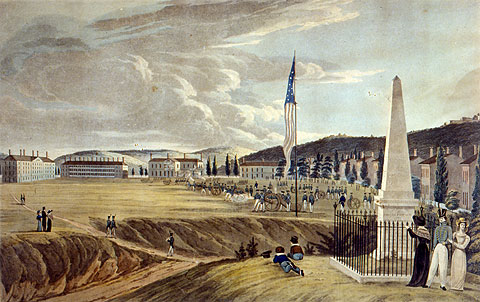O'Connell, with his history Ph.D. from the University of Virginia, has spent his
professional career within the National Ground Intelligence Agency, much information about which is not easily come by, as when one clicks on the url for the NGIA, one is barred as unsafe. However, there is this: and this, and many other sites, since, it seems, the agency is huge, with so many employees there are housing / real estate offices dedicated to helping them find somewhere to live within the Charlottesville area. Monticello is also in the area, illustrating once again how much Virigina -- and Maryland -- have profited since the federal capital was moved from Philadelphia to a situation carved from what was their state land.
These days O'Connell's a visiting professor at the Naval Postgraduate School, was formerly a contributing editor to MHQ: The Quarterly Journal of Military History. Over the course of his career he's written six books of military history, and a novel, Fast Eddy: A Novel in many Voices, a fictional biography of Captain Eddie Rickenbacker. PW review here.
This favorable review of the novel opens by characterizing the author as
". . . an iconoclastic military historian . . ."so one cannot be surprised by O'Connell's leaving the material of about Sherman the small child who loses his father, is separated from his mother and siblings to be raised in a foster family, not at the front of his biography, but at the end. The first interest O'Connell has in these matters is that Sherman's stepfather is wealthy and influential, thus an appointment to West Point, and rapid, early preferment - promotion in Sherman's career after graduation. These effects, O'Connell believes, part of the complex power struggle between Sherman and his foster father, who becomes his father-in-law, for possession of his foster-sister, then wife, Ellen, who is described as "Daddy's Girl."
Divided into "Part I: The Military Strategist"; "Part II: The General and His Army"; "Part III: The Man and His Families" the narrative moves as rapidly as "Sherman's Bummers" the foragers who fed the Union army as it burned slavery to the ground during Sherman's March to the Sea.
A short book, written in a rather annoying slangy style that one feels the author's editor imposed, this isn't the biography of a whole man in his times, in the way David McCullough's John Adams attempts. This is the biography of man who interests military men written by a military historian. Thus it opens with West Point, and concludes with Sherman's mistress. The first chapter provides the information that Sherman was very fond of women. Later O'Connell describes Sherman as possessing the healthy sex drive of a warrior.
 |
| The Plain of West Point (1828); little if any of pre-20th century West Point remains. |
Most of the emphasis of the West Point period -- gotten through briefly -- is what it meant to all these future officers of the Civil War that they shared the West Point experience, even that this was more important to all of them than their experience in the Mexican War. It was West Point that instilled into them all what to expect from each other, no matter which side they were on. Yet, when it was necessary, in order to win and finish the war, both Grant and Sherman behaved in unexpected ways, which shored them both up when necessary. The south's in-fighting -- every man king of his own plantation -- made this kind of effective outside-the-box behaviors impossible.
It's an interesting slant through which to view General Sherman's mind, and the military mind in general, or, which, perhaps, provides some unasked for information about mind of the author. One of the elements O'Connell's book keeps to the fore throughout is the political and personal jockeying within the army itself, before, during and after the war, for the sake of favor, promotion and fame. As most historians should learn early on, whether or not military matters are their area, is that war provides great opportunity to generals with dreams of political office, officers dreaming of general's stars, and even those who are considered in peace times of little account -- as with, General Grant, who would never have become General Grant or President Grant without the War of Southern Rebellion.
There is new information in this book for me, who is neither a military historian nor a specialist in the War of Rebellion itself and the battles, but who knows well the lead-up to secession and the war, and what happened to the country -- and the African Americans -- after Appomattox. This reader was taken very early by
O'Connell's account of Sherman in the second Seminole War, which began in 1835, and lasted just long enough for the new West Point graduate to get a bit of a baptism as to battle and campaign. However, O'Connell doesn't mention -- isn't interested? -- that the Seminoles was a 'new' tribe, created out of self-emancipated slaves and survivors of Mississippian tribes who suffered genocide during the colonial South Carolina era, and finished off by Jackson as consequence of the War of 1812.
This is why we always need to read more than a single biography -- or even four or five -- of significant figures in history -- there's always something new to learn, and something the writers don't know.





No comments:
Post a Comment